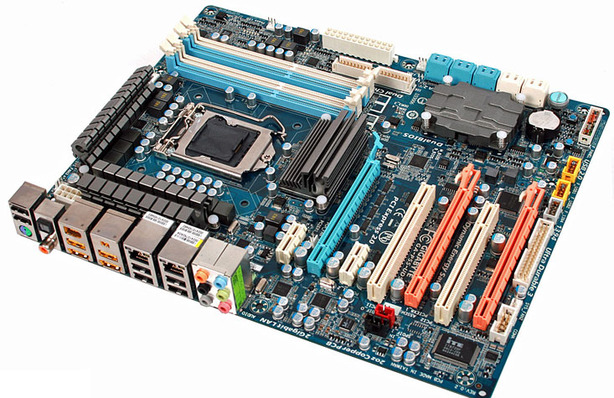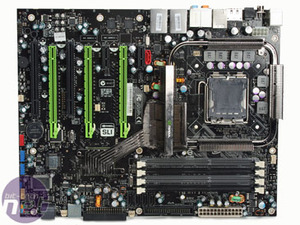
Your licence please sir...
The lack of an x86 licence isn’t Nvidia’s only concern when it comes to licences, as the company has been in a battle with Intel over its rights to manufacture chipsets for Nehalem-based processors. Regardless of whether or not Nvidia holds a bus license for Intel’s CPUs which use a Quick Path Interconnect, the rest of Nvidia’s chipset business has been left in tatters in the past twelve months as it has all but stopped making chipsets for AMD processors as well.The nForce 980a chipset isn’t much more than a rebadged nForce 780a with support for both DDR2 and DDR3 memory (in theory, that’s all controlled by the CPU anyway so it’s trivial). The only additions are support for higher HT frequencies and an extra Gigabit Ethernet connection – something that most nForce 780a motherboards supported anyway.
To make matters worse, this sorry state of affairs was followed up with suggestions from within AMD that Nvidia may not be licensed to make chipsets for AMD CPUs from 2010 onwards. Pat Patla, vice president of AMD’s server business unit, said that “we don’t expect to see new chipsets from Nvidia or Broadcom for server implementations in 2010. But they will continue to support all existing platforms moving forward through 2010” at the ‘Istanbul’ Opteron processor launch in April.
At the time, we questioned whether it’d affect all of AMD’s processor line ups given that Patla is in charge of just the server business unit, but we received no clarification from either company.
Given that Nvidia has effectively stopped making chipsets for the current high-end processors from both AMD and Intel, it may be that Nvidia is locked in negotiations with AMD over future licensing agreements. If nothing comes from those talks and the two can’t agree on a deal, we may see similar suits to the ones filed by Intel and Nvidia over their QPI licensing dispute.
Nvidia’s saving grace in the chipset business has been its integrated chipsets and in particular the Ion platform, which has had a fantastic critical reception – and deservedly so. But the future of Ion – and all of Nvidia’s integrated graphics chipsets for that matter – isn’t entirely concrete. Intel is planning to integrate the GPU onto its next generation Atom processor to further reduce power consumption, while both AMD and Intel are planning to integrate a basic GPU into future mainstream CPUs.
If this goes ahead and Nvidia doesn’t obtain licenses to build chipsets for both AMD and Intel processors, then the company will only be able to offer chipsets for Via’s Nano CPUs and any previous generation silicon from AMD and Intel. The problem there is that both AMD and Intel will quickly move on from previous generation products, as they have done in the past because demand tends to dry up as soon as something more powerful, more efficient and cheaper comes along. Living in the past is not something you can do in the technology industry, but one thing that we’ve constantly heard from Nvidia over the years is that it’ll only compete where it believes it can add value.

Most P55 boards will support SLI
As things stand at the moment, there’s no question that Nvidia can build a better integrated GPU than Intel – it has done so for years. The problem is that integrated graphics aren’t really powerful enough for gaming and if both Intel and AMD can deliver an integrated CPU/GPU that can easily handle Blu-ray and HD YouTube video playback, there’s no need for an integrated graphics chipset from Nvidia. We’ve constantly quizzed Nvidia on this point, but it has yet to come back to us with a convincing answer.
Moreover, given that Nvidia has licensed SLI – a technology that the company refused to license for many years – for Intel X58 and P55-based motherboards, one could argue that was the writing on the wall for Nvidia’s chipset business and it could be an admission that it can no longer add value in the performance chipset market. There are rumours that nForce hasn’t died a sorry death though, so we’re going to have to wait and see whether Nvidia has moved away from manufacturing chipsets completely.

MSI MPG Velox 100R Chassis Review
October 14 2021 | 15:04









Want to comment? Please log in.